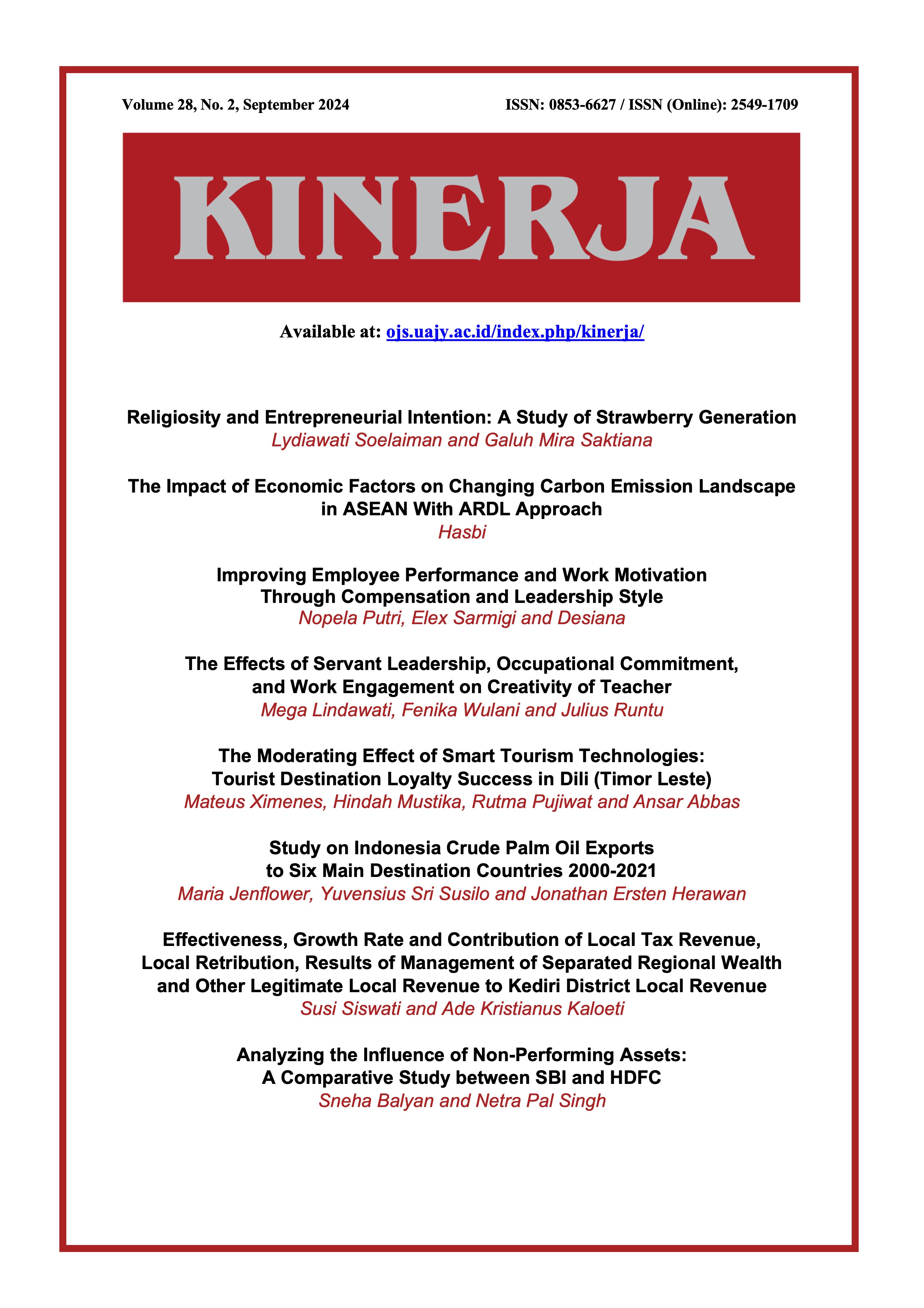Religiosity and Entrepreneurial Intention: A Study of Strawberry Generation
DOI:
https://doi.org/10.24002/kinerja.v28i2.8455Keywords:
religiosity, entrepreneurial, motivation, intention, strawberry generationAbstract
This research will be conducted on the Strawberry Generation, better known as Generation Z, aimed at testing religiosity on entrepreneurial intentions mediated by self-efficacy, subjective norms, attitudes, and entrepreneurial motivation. This study uses a non-probability sampling technique with a purposive sampling method, with a sample size of 207 respondents. The analysis tool that will be used is SEM AMOS 22. The influence of self-efficacy, subjective norms, and entrepreneurial attitudes as a mediation of the relationship between religiosity and the intensity of entrepreneurship in Generation Z is significant, meaning that someone religious makes Generation Z have the intention to entrepreneur because it has high self-efficacy, subjective norms and also high entrepreneurial attitudes. Entrepreneurial motivation apparently does not make a religious entrepreneur intend to have an entrepreneur for Generation Z.
References
Bekomson, A.N. and Ntamu, B.A., 2019. Religious value orientation and self-efficacy among secondary school students in Cross River State, Nigeria. Global Journal of Educational Research, 18(2), pp.81-89.
Bigdeloo, M. and Bozorgi, Z.D., 2016. Relationship between the religious attitude, self-efficacy, and life satisfaction in high school teachers of Mahshahr City. International Education Studies, 9(9), pp.58-66.
Carr, J.C. and Sequeira, J.M., 2007. Prior family business exposure as intergenerational influence and entrepreneurial intent: A theory of planned behavior approach. Journal of Business Research, 60(10), pp.1090-1098.
Carsrud, A. and Brännback, M., 2011. Entrepreneurial motivations: what do we still need to know?. Journal of Small Business Management, 49(1), pp.9-26.
Cooper, D. R. and Schindler, P. S., 2014. Business Research Method. 12*+ ed. New York: Mcgraw-Hill International Edition.
Dihni, V. A., 2022. Persentase Pengusaha/Penanggung Jawab Usaha Perdagangan Menurut Tingkat Pendidikan Terakhir (2020). Databoks.Katadata.Co.Id. Available at: https://databoks.katadata.co.id/datapublish/2022/02/17/pengusaha-di-indonesia-paling-banyak-lulusan-sma
Drnovšek, M., Wincent, J. and Cardon, M.S., 2010. Entrepreneurial self‐efficacy and business start‐up: developing a multi‐dimensional definition. International journal of Entrepreneurial Behavior & Research, 16(4), pp.329-348.
Farrukh, M., Khan, A.A., Shahid Khan, M., Ravan Ramzani, S. and Soladoye, B.S.A., 2017. Entrepreneurial intentions: the role of family factors, personality traits and self-efficacy. World Journal of Entrepreneurship, Management and Sustainable Development, 13(4), pp.303-317.
Fenech, R., Baguant, P. and Ivanov, D., 2019. Entrepreneurial attitudes, self-efficacy, and subjective norms amongst female Emirati entrepreneurs. International Journal of Entrepreneurship, 23(1), pp.1-11.
Fikrianoor, K., Nugroho, A.D., Ganinda, F.P. and Hidayatulloh, A., 2021. Determinants of Student Interest to Become Entrepreneurs. Jurnal Reviu Akuntansi Dan Keuangan, 11(2), pp.321-331.
Ghozali, I., 2017. Model Persamaan Structural: Konsep dan Aplikasi dengan Program AMOS 24. Semarang: Universitas Diponegoro
Gursoy, D., Altinay, L. and Kenebayeva, A., 2017. Religiosity and entrepreneurship behaviours. International Journal of Hospitality Management, 67, pp.87-94.
Hessels, J., Van Gelderen, M. and Thurik, R., 2008. Drivers of entrepreneurial aspirations at the country level: the role of start-up motivations and social security. International Entrepreneurship and Management Journal, 4, pp.401-417.
Kautonen, T., Van Gelderen, M. and Fink, M., 2015. Robustness of the theory of planned behavior in predicting entrepreneurial intentions and actions. Entrepreneurship Theory and Practice, 39(3), pp.655-674.
Kusmintarti, A., Asdani, A. and Riwajanti, N.I., 2017. The relationship between creativity, entrepreneurial attitude and entrepreneurial intention (case study on the students of State Polytechnic Malang). International Journal of Trade and Global Markets, 10(1), pp.28-36.
Krueger Jr, N.F., Reilly, M.D. and Carsrud, A.L., 2000. Competing models of entrepreneurial intentions. Journal of Business Venturing, 15(5-6), pp.411-432.
Liñán, F. and Chen, Y.W., 2009. Development and cross–cultural application of a specific instrument to measure entrepreneurial intentions. Entrepreneurship Theory and Practice, 33(3), pp.593-617.
Marler, P.L. and Hadaway, C.K., 2002. “Being religious” or “being spiritual” in America: A zero‐sum proposition?. Journal for the Scientific Study of Religion, 41(2), pp.289-300.
Newman, A., Obschonka, M., Schwarz, S., Cohen, M. and Nielsen, I., 2019. Entrepreneurial self-efficacy: A systematic review of the literature on its theoretical foundations, measurement, antecedents, and outcomes, and an agenda for future research. Journal of Vocational Behavior, 110, pp.403-419.
Purwana, D. and Suhud, U., 2018. Investigating the effect of motivation on entrepreneurial intention: three different approaches. Problems and Perspectives in Management, 16(2), pp.200-208.
Ramayah, T. and Harun, Z., 2005. Entrepreneurial intention among the student of Universiti Sains Malaysia (USM). International Journal of Management and Entrepreneurship, 1(1), pp.8-20.
Rehan, F., Block, J. and Fisch, C., 2019. Entrepreneurship in Islamic communities: How do Islamic values and Islamic practices influence entrepreneurship intentions?. Journal of Enterprising Communities: People and Places in the Global Economy, 13(5), pp.557-583.
Rietveld, C. and Hoogendoorn, B., 2022. The mediating role of values in the relationship between religion and entrepreneurship. Small Business Economics, Vol. 58 No. 3, pp. 1309-1355
Santos, S.C. and Liguori, E.W., 2020. Entrepreneurial self-efficacy and intentions: Outcome expectations as mediator and subjective norms as moderator. International Journal of Entrepreneurial Behavior & Research, 26(3), pp.400-415.
Sekaran, U. and Bougie, R., 2016. Research Method for Business. Chichester: John Wiley & Sons.
Shane, S., Locke, E.A. and Collins, C.J., 2003. Entrepreneurial motivation. Human Resource Management Review, 13(2), pp.257-279.
Sia, S.K. and Jose, A., 2019. Attitude and subjective norm as personal moral obligation mediated predictors of intention to build eco-friendly house. Management of Environmental Quality: An International Journal, 30(4), pp.678-694.
Siswanto, S., 2023. Religiosity and entrepreneurial motivation roles in the goal-specific relation: A case of Muslim students in Indonesia. Journal of Islamic Accounting and Business Research.
Solesvik, M.Z., 2013. Entrepreneurial motivations and intentions: investigating the role of education major. Education+ Training, 55(3), pp.253-271.
Soomro, B.A. and Shah, N., 2022. Entrepreneurship education, entrepreneurial self-efficacy, need for achievement and entrepreneurial intention among commerce students in Pakistan. Education+ Training, 64(1), pp.107-125.
Sugiyono, S., 2013. Metode Penelitian Kuantitatif, Kualitatif, dan R&D. Bandung: Alfabeta.
Terry, D.J., Hogg, M.A. and White, K.M., 1999. The theory of planned behaviour: self‐identity, social identity and group norms. British Journal of Social Psychology, 38(3), pp.225-244.
Onjewu, A.K.E., Anosike, P. and Godwin, E.S., 2023. The mediating role of planned behaviour in the religiosity and nascent entrepreneurship nexus. International Journal of Entrepreneurial Behavior & Research, 29(8), pp.1950-1969.
Onjewu, A.K.E., Haddoud, M.Y., Tony-Okeke, U., Cao, D. and Nowiński, W., 2022. Dissecting the effect of family business exposure on entrepreneurial implementation intention. International Journal of Entrepreneurial Behavior & Research, 28(6), pp.1438-1462.
Vats, P., Dhanda, N. and Wadhawan, P., 2021. Religious orientation: an exploration towards self-efficacy. Indian Journal of Positive Psychology, 12(1), pp.85-90.
Westhead, P. and Solesvik, M.Z., 2016. Entrepreneurship education and entrepreneurial intention: Do female students benefit?. International Small Business Journal, 34(8), pp.979-1003.
Zhao, H., Seibert, S.E. and Hills, G.E., 2005. The mediating role of self-efficacy in the development of entrepreneurial intentions. Journal of Applied Psychology, 90(6), p.1265.
Downloads
Published
Issue
Section
License
Copyright (c) 2024 Lydiawati Soelaiman, Galuh Mira Saktiana

This work is licensed under a Creative Commons Attribution 4.0 International License.















